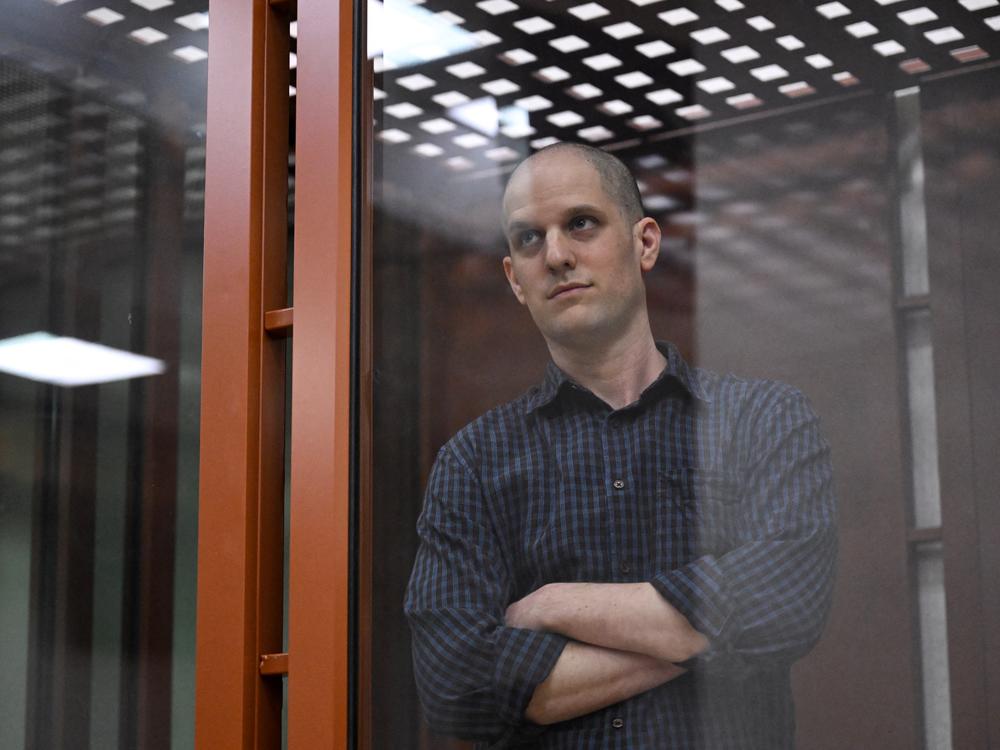Section Branding
Header Content
Russian court sentences U.S. journalist Evan Gershkovich to 16 years in prison
Primary Content
MOSCOW — A Russian court convicted Wall Street Journal correspondent Evan Gershkovich on charges of espionage Friday — sentencing the American to 16 years in a Russian prison colony in a closed-door trial denounced as a sham by the journalist’s newspaper and the U.S. government. Prosecutors had requested an 18-year sentence.
The proceedings took place in Russia’s Ural Mountains capital of Yekaterinburg — the city where Russian security agents first detained Gershkovich while he was on a reporting assignment in March 2023.
Prosecutors later accused Gershkovich of collecting “secret information” about a regional Russian tank factory, Uralvagonzavod, on the orders of the CIA.
The judge held just two hearings — out of the public eye and with no consular officials present — before finding Gershkovich guilty of the charges.
Gershkovich and the Wall Street Journal have vehemently denied the spying allegations from the beginning.
They note that Gershkovich was operating in Russia with official accreditation from Russia’s Foreign Ministry at the time of his arrest.
In a statement Friday morning Dow Jones CEO and Wall Street Journal publisher Almar Latour and editor in chief Emma Tucker said: “This disgraceful, sham conviction comes after Evan has spent 478 days in prison, wrongfully detained, away from his family and friends, prevented from reporting, all for doing his job as a journalist. We will continue to do everything possible to press for Evan’s release and to support his family. Journalism is not a crime, and we will not rest until he’s released. This must end now.”
President Biden said in a statement: “Today, Evan Gershkovich received a sentence of 16 years in a Russian prison, despite having committed no crime. Rather, he was targeted by the Russian government because he is a journalist and an American. We are pushing hard for Evan’s release and will continue to do so. As I have long said and as the U.N. also concluded, there is no question that Russia is wrongfully detaining Evan. Journalism is not a crime. We will continue to stand strong for press freedom in Russia and worldwide, and stand against all those who seek to attack the press or target journalists."
The U.S. government has characterized the spying charges as “fiction.” Shortly after Gershkovich’s detention, the State Department designated him “wrongfully detained” and insisted he was being punished for his work as a journalist.
“We have been clear from the start that Evan has done nothing wrong and never should have been arrested in the first place,” the U.S. Embassy in Russia said in a statement as the trial got underway last month.
“His case is not about evidence, procedural norms, or the rule of law. It is about the Kremlin using American citizens to achieve its political objectives.”
The guilty verdict was never much in doubt —- nearly all Russian criminal cases end in conviction.
The Kremlin and top Russian officials had also publicly argued Gershkovich was caught “red handed.”
Yet the unusual speed of proceedings — espionage trials often take months if not years — was all but certain to fuel speculation that Moscow and Washington may be closing in on a prisoner swap deal.
The Biden administration has made no secret it had made several past offers to Moscow aimed at gaining the release of Gershkovich and Paul Whelan, another American serving a lengthy prison sentence on espionage charges.
Former President Donald Trump, too, has suggested he could bargain with Moscow for Gershkovich’s release if reelected.
"We're continuously in contact with the U.S. government," Wall Street Journal general counsel Jason Conti tells NPR. "It's been a lot of engagement there and we appreciate their support ... And we try and keep the pressure on to try and get a political resolution to this as quickly as possible. ... It's nearing 500 days and it's just way too long."
Conti added: "And of course, the added element for Evan is that he's a journalist. And so it sends this message to Western journalists, hey, be careful what you're doing in Russia. We can put you in jail and gin up bogus espionage charges against you for simply doing your job, which of course, chills the ability to cover Russia, which is perfectly fine from Russia's perspective. And the problem we have is that there really hasn't been any consequences as a result of this action. And so you worry about this kind of tactic being used more and more.”
This week, Russia’s Foreign Minister Sergei Lavrov told journalists that back-channel talks between Washington and Moscow were “ongoing.”
In a meeting with international journalists on the sidelines of an economic forum earlier this month, Putin said the U.S. was taking “vigorous steps” to free Gershkovich.
“But such issues are not resolved through the media,” the Russian leader added. “They like a quiet, calm, professional approach and dialogue between intelligence agencies. And, of course, they should be resolved only on the basis of reciprocity.”
In the past, Putin has strongly suggested he would trade Gershkovich for a convicted Russian state assassin currently imprisoned on a murder conviction in Germany.
Yet Russian officials have also insisted any trade involving Gershkovich could only happen once a verdict has been reached.
NPR's Jackie Northam contributed to this story from Washington, D.C.

